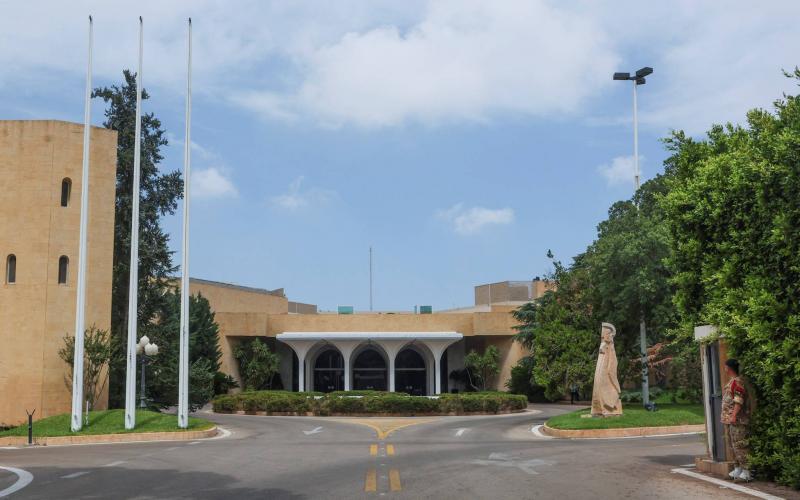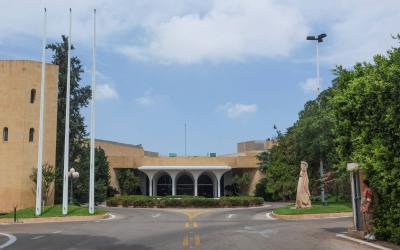The presidency has remained vacant since Michel Aoun's term ended in October, exacerbating the political paralysis that has worsened the ongoing financial crisis for four years. A Maronite Christian must hold the presidency under the country’s confessional power-sharing system. Reuters reported in an article titled "Facts of Lebanon... Candidates for the Vacant Presidential Position" about the current political impasse in Lebanon.
The Lebanese parliament is set to convene next Wednesday in an attempt to elect a new president. However, with major parties unable to reach an agreement on a candidate, it is unlikely that the parliamentary session will result in a new president. None of the currently proposed main candidates has enough broad support for election. Regulations require that two-thirds of the 128 parliament members attend the session for it to proceed, meaning that one-third of the lawmakers can disrupt the voting by not attending. Below is a list of the main candidates for the position:
**Jihad Azour**
Azour previously served as Minister of Finance and has been the Director of the Middle East and Central Asia at the International Monetary Fund (IMF) since 2017. He has received nominations from several parties, notably Lebanon's two largest Christian parties, the Lebanese Forces and the Free Patriotic Movement, which are at odds over various issues. Azour also has the support of the Progressive Socialist Party, the largest Druze party led by Walid Jumblatt. In his first comment on his candidacy, Azour stated that his nomination is "a call for unity." He served as Minister of Finance from 2005 to 2008, during a period marked by political conflict between a government supported by the West and Saudi Arabia against Syria-allied opponents led by Hezbollah. At the same time, Hezbollah described Azour as a "confrontation and challenge candidate," referring to his ministerial role during a political crisis that peaked with armed conflict in May 2008, when Hezbollah took control of a large part of Beirut. However, the leader of the Lebanese Forces, Samir Geagea, characterized Azour as neutral, stating that a Lebanese candidate needs to implement reforms to address the financial crisis. During his tenure at the IMF, Azour helped reach a preliminary funding agreement with Beirut worth three billion dollars, which included certain reform requirements that the government failed to implement most of.
**Suleiman Frangieh**
Suleiman Frangieh is the grandson of a president who was elected in 1970 and is descended from a Lebanese family with a long political history. He has long been viewed as a potential president. He nearly reached the presidential palace in 2016 before the position was awarded to former President Michel Aoun as part of a political agreement among several parties. His main supporters this time are Hezbollah and the Amal Movement, led by Speaker of Parliament Nabih Berri. Frangieh (57 years old) has a strong friendship with Syrian President Bashar al-Assad. He described Hezbollah's military arsenal as necessary for Lebanon’s defense against Israel, while his close ties with Hezbollah are a major reason for the opposition to his nomination. Frangieh entered politics early in his life after the murder of his parents and sister by a Christian militia in 1978 at their home in the town of Ehden in northern Lebanon. He is considered one of the most prominent figures in the Lebanese political system, especially in the post-civil war period, which was marked by "Syrian hegemony" lasting 15 years after the war, until Syria was forced to withdraw in 2005 following the assassination of former Prime Minister Rafik Hariri.
**Joseph Aoun**
Although expectations suggest that the parliament session on Wednesday will see Frangieh and Azour face each other, some view Army Commander Joseph Aoun as a potential third candidate. Aoun has been leading the army since 2017, a period during which the country began showing signs of financial crisis. In 2021, Aoun warned that the collapse would inevitably lead to the downfall of all state institutions, including the Lebanese army, which is considered the backbone of the country. As an experienced military leader, Aoun criticized the politicians who held governing positions in the country for the collapse, stating that soldiers were suffering from hunger like the rest of the Lebanese and questioning the politicians, "What do you plan to do?" Shortly after taking command of the army in 2017, Aoun led the battle that resulted in the defeat of Islamic State fighters on the eastern border between Syria and Lebanon. The military operation received praise from the U.S. ambassador at the time, who stated that the army had performed excellently. Geagea has previously expressed his support for Aoun as a potential president, crediting him with managing the army effectively and acting as a statesman. However, others oppose his candidacy, including Free Patriotic Movement leader MP Gebran Bassil, who stated earlier this year that Aoun is "usurping the powers of the Minister of Defense" and accused him of involvement in corruption cases.




